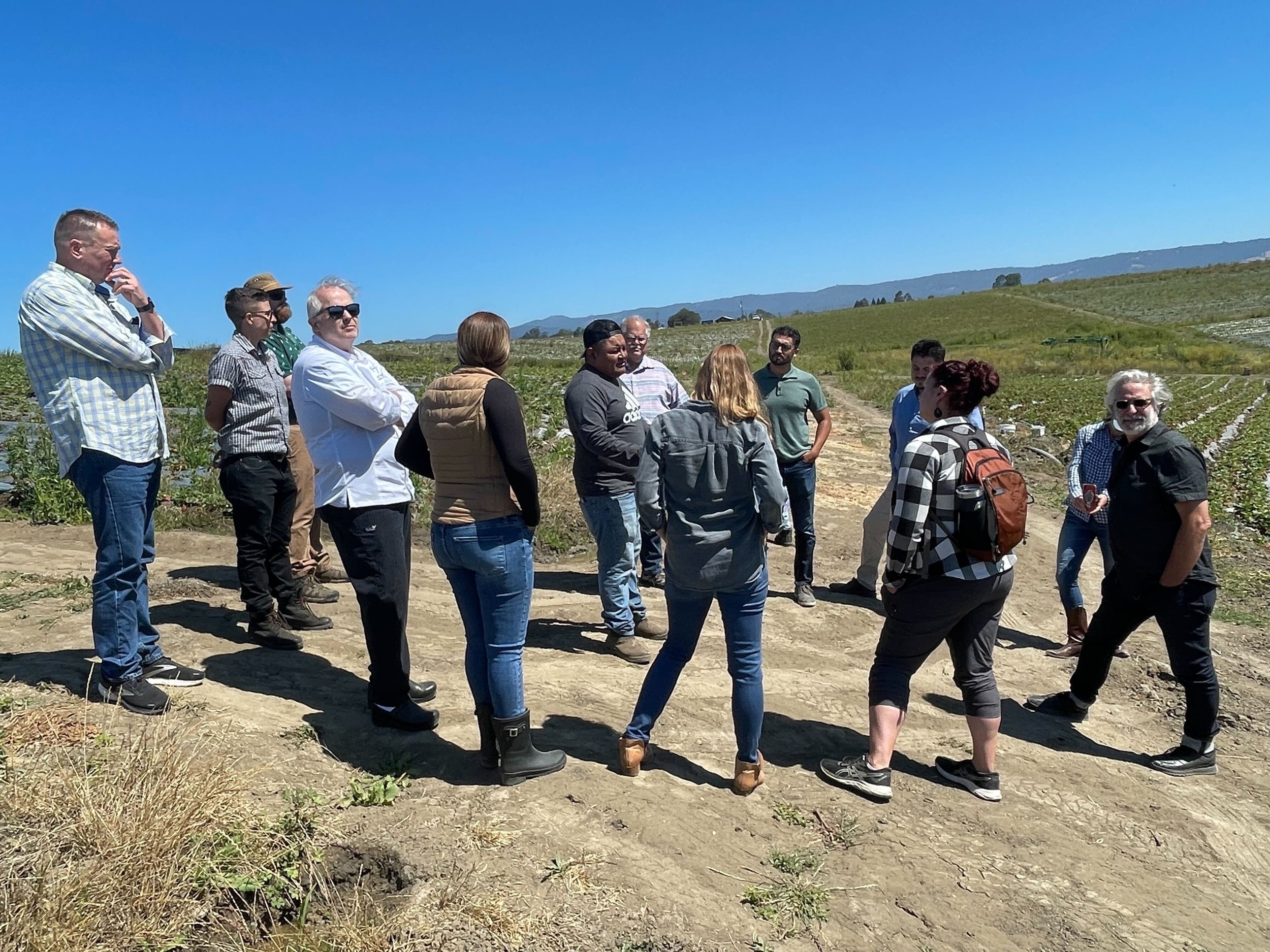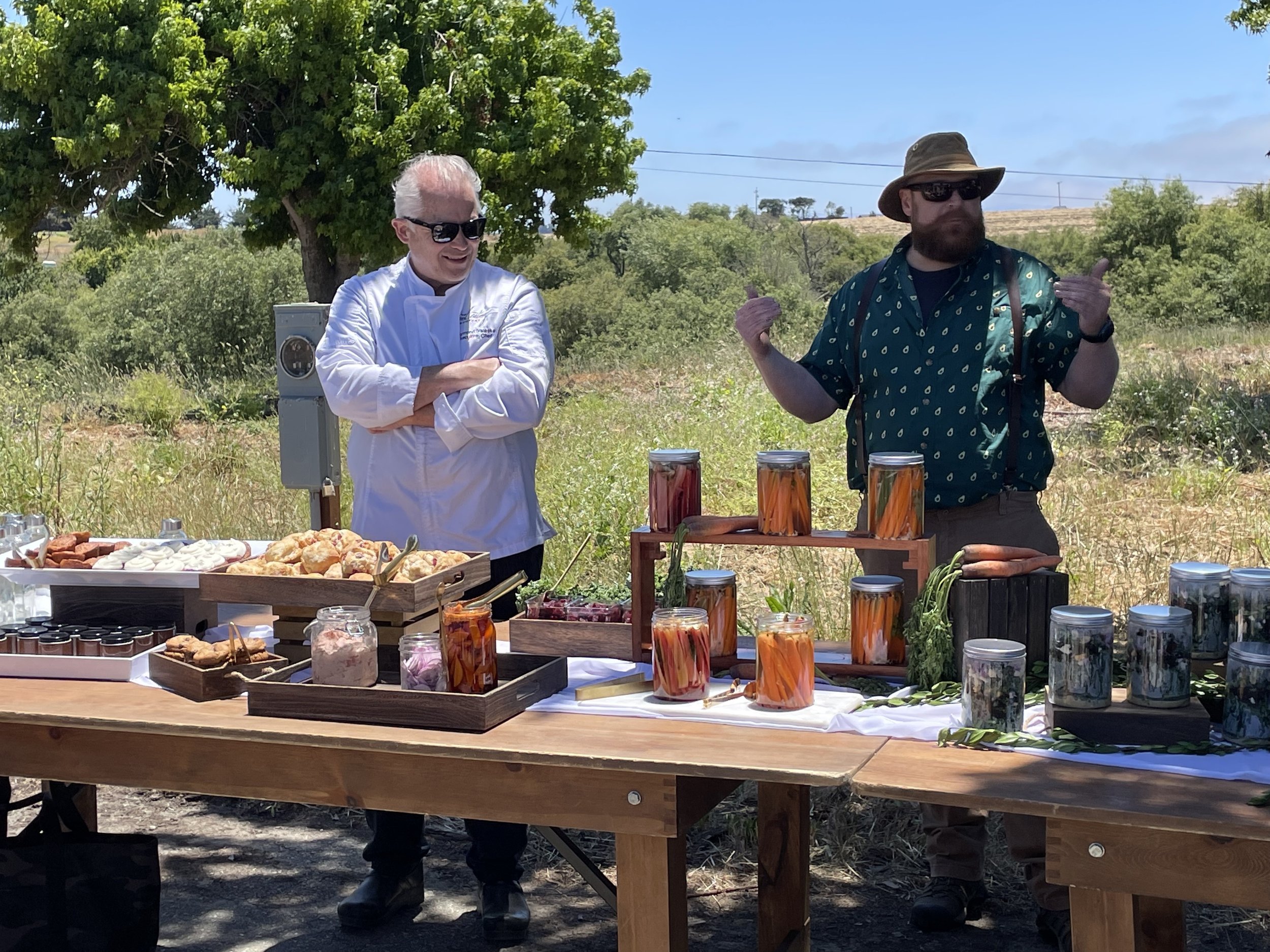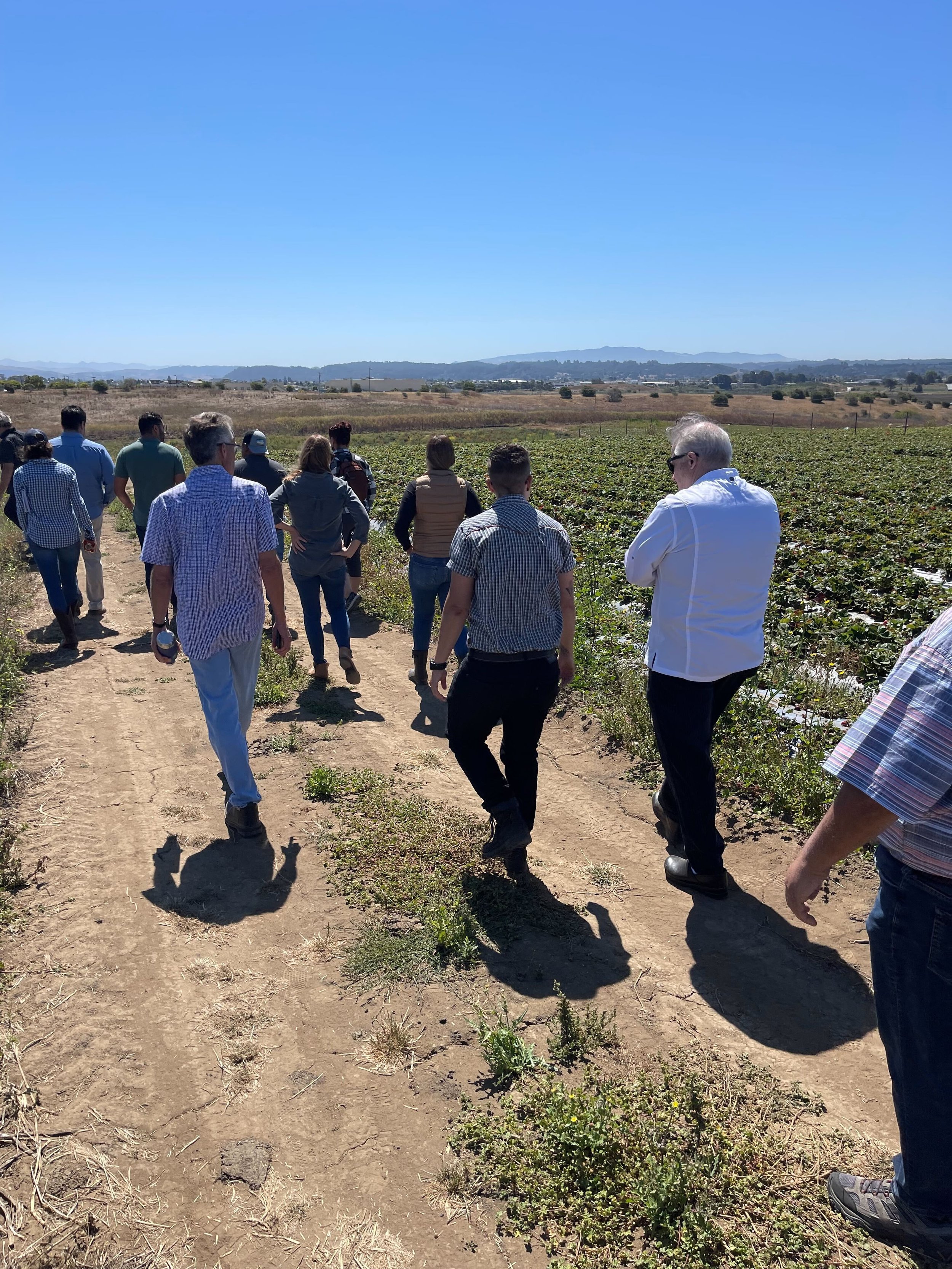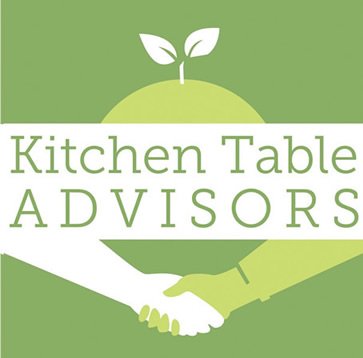Field Notes: Building Trust Through Selling Vegetables
August 30th, 2022
[Read Time: 10 minutes]
About Our Market Access Field Notes…
Complementary to our 1:1 advising program, KTA has been expanding our Ecosystem Building program, which focuses on building a friendlier marketplace that removes barriers and friction points around land, capital, and markets for small-scale farmers and ranchers. This post is part two of a series authored by our previous Value Chain Manager (currently Owner & CEO of SupplyChange) H Nieto-Friga highlighting our on-the-ground market access work in deepening sales relationships and developing new supply chains between KTA clients and regional procurement partners. We invite you to also connect with parts one and three of this series.
On a Friday in late June, a diverse group of tech company executives and chefs from across the Bay Area gathered in sunny Watsonville to celebrate and deepen their understanding about a groundbreaking sourcing pilot known as BIPOC Regenerative. After a year of work moving thousands of pounds of produce from KTA client farmers to employee cafes throughout the Bay Area, company representatives came to Chelito Organics and Salazar Organic Farms to meet the farmers face-to-face and explore how to grow and institutionalize the pilot into a thriving program that includes more farmers, more products, and new ideas.
The visit started with tours led by two pilot participants and KTA clients; to the crowd, Misael Morales of Chelito Organics spoke powerfully about the complexity of decisions he encounters in building his crop plans each year when faced with high levels of uncertainty amongst his limited set of buyers. Alejandro Salazar of Salazar Organic Farms shared his creative ideas about how he has planned his production more collaboratively, including his willingness to grow specific climate-friendly varietals of produce about which the chefs in attendance were unaware.
Both Alejandro and Misael had surfaced shared concerns around buyer uncertainty and risk, which were echoed during the farmer interviews and surveys conducted in the development of KTA’s value chain strategy focused on larger buyer partners. The wholesale market, where many of our Central Coast clients sell and are limited to, can be an unfriendly place for small and mid-sized farms – especially for those farmers who identify as BIPOC, women, and/or monolingual Spanish-speaking. Furthermore, many client farmers and ranchers cited limited marketplaces as their primary barrier to financial health, often having only one or two inconsistent wholesale buyers at most. Since some small-scale farmers and ranchers lack connections and access to information, they can often struggle to identify new market opportunities within and beyond this realm.
When considering our clients’ product availability and openness to exploring new sales relationships, the foodservice sector represents a promising channel for regional farmers looking to develop partnerships with larger buyers. Through sourcing pilots like BIPOC Regenerative, we can help translate the capacities and needs of our clients into orders and commitments placed by chefs within larger companies.
Learn More: The Challenges of Wholesale for Small-Scale Farmers
A small-scale farmer might get a rough plan of what to grow from the one or two wholesale buyers they work with over a season, yet almost always the quantities actually purchased and the pricing can be extremely volatile. In 2021, two core crops in the Central Coast region, lettuce and strawberries, fluctuated between $20 and $4 per case, in addition to the cooling and packaging fees farmers pay that are only increasing with inflation. This makes financial planning difficult, and farmers have little leverage without gaining more sales relationships. A foodservice pilot that grows into a sustaining relationship gives farmers the information they need to plant the right crops in the right quantities, and more fixed pricing they can depend on, empowering them to make more informed decisions about growing their business and the cash flow to invest in new tools, techniques, and experimental crops on their land.
A Pilot Is Born
The BIPOC Regenerative pilot emerged from REGEN1, an accelerator that promotes regenerative agriculture by convening farmers, ranchers, vintners, scientists, academics, distributors, institutions, retailers, food brands, and tech companies to create a set of market-driven standards that allow buyers to discover and buy from growers who use regenerative practices. Last summer, I had been advising REGEN1’s steering committee on issues core to KTA’s value chain work. When ideas surfaced about interviewing BIPOC farmers regarding participating in the REGEN1 marketplace, I raised a suggestion: what if we actually tested it? From there, an idea was born for a pilot that would directly link 10 KTA client farmers who already use regenerative practices on their fields with values-aligned buyers.
I found a willing collaborator in Renee McKeon, VP of Sustainability and Corporate Social Responsibility at Sodexo, a national foodservice management company. Renee has played a key role in helping define Sodexo’s emerging goals of supporting regenerative agriculture and creating a partnership model geared towards farmers who have been under-resourced and unrecognized. Renee and I knew that starting small and staying focused on growing a pilot carefully and sustainably was the best path forward. We were committed to all participating growers being from the Latinx, immigrant community as these farmers face unique challenges in the market while also leading application of regenerative practices that promote carbon sequestration and overall soil health. Working with Renee and KTA advising staff, we identified a total of 10 pilot participant farmers from KTA’s Central Coast region to supply seven Northern California clients of Good Eating Company (GEC), a sustainably-minded subsidiary of Sodexo that has committed to sourcing from regenerative suppliers.
This diagram shows the flow of produce from KTA client farms through the supply chain to the two distributor partners and into each company's client accounts.
Learn More: The Ins and Outs of the Foodservice Sector
The foodservice sector includes schools, hospitals, and corporations. The market delivers massive quantities of food to employee, student, and customer cafeterias every day, meaning that sourcing pilots in this area could include 40 small-scale growers, whereas a local retail chain might only have the capacity for 1-2 small-scale farmers. Additionally, foodservice tends to have less strict uniformity and grading standards for producers since the ingredients are chopped and cooked in meals for customers. Many foodservice chefs are also able to be more flexible with seasonal produce and change their menus regularly. All of these factors can add up to an exciting path for KTA client farmers to gain a new and robust market foothold.
Next, we engaged Vesta Foodservice, GEC’s primary produce distributor, to help us streamline services that enable easier purchasing and tracking for our buyers. Finally, we reached out to True Harvest, a Watsonville aggregator owned and operated by Rogelio Ponce Jr., a proud member of the local farming community as well as a member of KTA’s Kitchen Cabinet. True Harvest’s partnership allowed Vesta to purchase all eligible farmers’ produce more efficiently based on the availability list that True Harvest sends out each week to Vesta and GEC clients.
After several months of planning, in mid-2021 we were thrilled to have Google approach us about joining the pilot. Since Google’s three largest Bay Area campuses are customers of Vesta Foodservice, it made perfect sense to plug them in as recipients.
Initial sales occurred gradually, with the farmers selling eight, then up to 24 unique products at once to these new buyers. As the pilot progressed and conversations took place with leadership at both GEC and Google, we were able to develop Just BIPOC Sourcing, a website generously funded by Google that gives insight into how the pilot got started, advice for others on how to build foodservice-specific sourcing pilots, and a reflection of KTA’s value chain work overall, noting that our pilot is moving in the direction of formalizing and still in a state of experimentation.
From Watsonville Fields to Bay Area Cafeterias



As we came together on that June afternoon in Watsonville, we spent time reflecting both on what we had accomplished as well as the steps we would take to grow the pilot even more. Over a delicious, hyperlocal lunch with ingredients grown by pilot participant farms and prepared by GEC chefs, Misael and Alejandro were able to connect with Renee McKeon, REGEN1 founder Douglas Gayeton, Google’s VP of Workplace Services Michiel Bakker, GEC CEO Don King, as well as leaders and chefs from multiple GEC customers like LinkedIn and Jackson Labs. In watching the group listen to the farmers relaying their experiences in the marketplace, it was clear that folks were actively reflecting on how they could engage with these farmer leaders to share power across the food system.
The tour energized all who attended; in the weeks that followed, we started working with GEC and Google on six month commitments that would allow KTA client farmers to build definitive crop plans that Misael, Alejandro and many others had named as being supportive in these sales relationships. In the field of value chain coordination, this is a remarkable achievement in a relatively short amount of time, especially because of the complexities of linking farmers who are growing on as little as five acres to large international companies.
This pilot was conceived as an exercise not just in selling vegetables, but in building trust. In our value chain work, we envision a world where there is an increase in farmers’ power and access in the value chain, where buyers innovate and experiment alongside smaller producers, where buyers and growers are personally involved and taking steady steps together towards rebuilding our regional food system to be more just and inclusive for all stakeholders. With gatherings like these, we can empower farmers and stoke creativity from chefs, while building trusted and collaborative relationships.
For foodservice stakeholders, value chain coordinators, and advocates who are interested in replicating our model for the BIPOC Regenerative sourcing pilot, please visit Just BIPOC Sourcing, contact us directly at info@kitchentableadvisors.org, and keep up with our value chain page as we continually update it with resources.
PC: Liz Aviles & H Frambach




